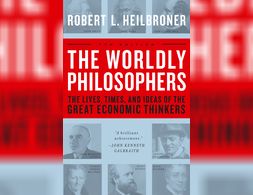✕
1142 results
Potts (economics, University of Queensland) proposes evolutionary microeconomics as a synthesis of the collective schools of heterodox economic thought with complex systems theory and graph theory.
This unique up-to-date volume not only provides state-of-the-art discussions of the most recent developments in modern macroeconomics but also includes a series of interviews with leading economists that shed new light on the major intellectual and policy issues of the 1990s. The book is at once an invaluable text and a superb overview that will be welcomed by teachers and students alike.
Financialization is one of the most innovative concepts to emerge in the field of political economy during the last three decades, although there is no agreement on what exactly it is. Profiting Without Producing by Costas Lapavitsas puts forth a distinctive view defining financialization in terms of the fundamental conduct of non-financial enterprises, banks and households.
Adhering to the multiplicity of degrowth whilst also arguing that strategic prioritisation and coordination are key, Degrowth & Strategy advances the debate on strategy for social-ecological transformation. It explores what strategising means, identifies key directions for the degrowth movement, and scrutinises strategies in practice that aim to realise a degrowth society.
Since the Middle Ages, literature has portrayed the economic world in poetry, drama, stories and novels. The complexity of human realities highlights crucial aspects of the economy. The nexus linking characters to their economic environment is central in a new genre, the "economic novel", that puts forth economic choices and events to narrate social behavior, individual desires, and even non-economic decisions.
This blog post reviews "Democratizing Finance", an edited volume that analyses and provides policy proposals to ensure that the financial system serves the public good. Mquzama undertakes the task of summarising the main takeaways from each essay in the book as well as an exposition of its shortfalls. While he acknowledges the necessity of the book's reimaging capitalism and the financial system in a way that is practical within the current economic and political structures, he also highlights its failure to look beyond the United States of America.
Big challenges lie ahead for our society: increased automation of work, and the threat of catastrophic climate change. But so, too, are the huge possibilities presented by new technology and better ways of organising our economy in the wake of neoliberalism's failure.
Is inflation just a number game or does it hold deeper societal implications? Join Isabella Weber (@UMass.Amherst) as she challenges traditional economic stances on inflation and delves into the social dimensions of pricing. Discover how context shapes our reactions to price hikes and why understanding this can be a game-changer.
This lecture offers a general and introductory overview of the theory of racial capitalism, focusing on the origins of racial capitalism and some of the debates it has generated.
This is an introductory course into economics that navigates the intellectual history of political economy in a self-contained and non-technical manner. The course centres on the classical concept of political economy by emphasizing the moral and ethical problems that markets solve or may not solve.
In Colonial Debts Rocío Zambrana develops the concept of neoliberal coloniality in light of Puerto Rico's debt crisis. Drawing on decolonial thought and praxis, Zambrana shows how debt functions as an apparatus of predation that transforms how neoliberalism operates.
This course describes Bayesian statistics in which one s inferences about parameters or hypotheses are updated as evidence accumulates You will learn to use Bayes rule to transform prior probabilities into posterior probabilities and be introduced to the underlying theory and perspective of the Bayesian paradigm The course will apply …
The Privatized State shows how privatization undermines the very reason political institutions exist in the first place, and advocates for a new way of administering public affairs that is more democratic and just.
Economics for Emancipation (E4E) is a seven-module introductory curriculum with interactive and participatory workshops. It offers a deep critical dive into the current political economic system, exploration of alternative economic systems, and dynamic tools to dream and build the economy that centers care, relationship, and liberation.
The bestselling classic that examines the history of economic thought from Adam Smith to Karl Marx—“all the economic lore most general readers conceivably could want to know, served up with a flourish” (The New York Times). The Worldly Philosophers not only enables us to see more deeply into our history but helps us better understand our own times. In this seventh edition, Robert L. Heilbroner provides a new theme that connects thinkers as diverse as Adam Smith and Karl Marx.
This open access book presents an alternative to capitalism and state socialism through the modelling of a post-market and post-state utopia based on an upscaling of the commons, feminist political economy and democratic and council-based planning approaches.
The productive work of widely distributed academic research has contributed substantially, over the postwar period, to important advances in our understanding. It has also offered a clearer recognition of many unresolved problems. Never theless, the progress achieved over the last decades, ex hibited by the systematic application of "theory" to actual issues and observable problems, could not overcome a per vasive sense of dissatisfaction.
The climate crisis is not primarily a problem of ‘believing science’ or individual ‘carbon footprints’ – it is a class problem rooted in who owns, controls and profits from material production. As such, it will take a class struggle to solve. In this ground breaking class analysis, Matthew T. Huber argues that the carbon-intensive capitalist class must be confronted for producing climate change.
This is an important contribution both to advancing theoretical and empirical understandings of African monetary sovereignty and to putting problems and possibilities relating to African monetary sovereignty on the political agenda This is of utmost importance given that these issues have largely not received much attention in contemporary discussions of …
Source image New Economic Thinking Youtube channel Some years ago in the aftermath of the great financial crisis GFC of the first decade of the twentieth century Paul Krugman famously remarked that most macroeconomics of the last thirty years was spectacularly useless at best and positively harmful at worst It …
Though apparently siblings from the same family, New Keynesianism and Post-Keynesianism are completely different schools of economic thought. As to why and in what regard exactly, that is what this book is all about. While the former is the official label of the current mainstream in economic research and teaching (rather than neoclassic economics, which would be more apt a term), the latter tries to preserve the original thinking of John Maynard Keynes, but also additional ideas and concepts of all those building on his work.
Identity politics is everywhere, polarising discourse from the campaign trail to the classroom and amplifying antagonisms in the media. But the compulsively referenced phrase bears little resemblance to the concept as first introduced by the radical Black feminist Combahee River Collective.
We use cookies on our website. Click on Accept to help us to make Exploring Economics constantly better!





















